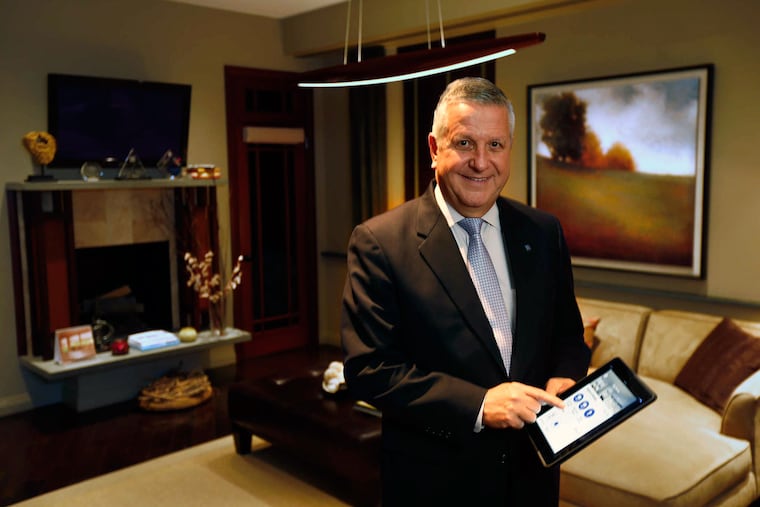Michael Pessina
Lutron co-chief executive Michael Pessina, 61, was still in kindergarten 56 years ago when Lutron's founder, physicist Joel Spira, was noodling around with light switches and dimmers in the spare bedroom of his New York apartment.

Lutron co-chief executive Michael Pessina, 61, was still in kindergarten 56 years ago when Lutron's founder, physicist Joel Spira, was noodling around with light switches and dimmers in the spare bedroom of his New York apartment.
The result of Spira's noodling - the first dimmer light switch able to be installed in the average home's wall box - led to the creation of Lutron Electronics Co. Inc., in Coopersburg, south of Allentown.
Dimmers evolved to residential and commercial control systems allowing lights, shades, heating systems, and security to be linked for energy savings, beauty, and safety. Lincoln Financial Field, the Statue of Liberty, and the Bank of China headquarters in Beijing all use Lutron lighting systems.
Spira, who died in April, lived long enough to see Lutron Electronics become a dominant player in the "smart home" movement - one of the key themes at this year's Consumer Electronics Show, which starts Monday in Las Vegas and draws 170,000 attendees and 3,200 exhibitors, including Lutron.
Lutron will be touting its modestly priced Caseta Wireless product, which allows customers to use a mobile app to control lights, shades, security and temperature.
"If you talk to architects, electrical engineers, lighting designers, contractors - they know Lutron and what we stand for: great quality, great products," said Pessina, 61, Spira's successor, who shares leadership with Spira's daughter.
"If you go to the consumer level, our brand recognition isn't as great," Pessina said. "When you describe their light dimmer in their dining room or kitchen, they look and see it's Lutron, but they may not have known it. They just knew they had a nice product there.
"The Consumer Electronics Show helps advance our brand," he said.
Consumer electronics seems to be smartphones, and televisions - not so much dimmer switches and lightbulbs.
The electrical industry is now a consumer electronics industry, because lightbulbs are changing very fast. LEDs bring you into a completely new world because every lightbulb has a microprocessor in it that can be changed in different ways. So how does our dimming technology interface with that?
Does it involve a new programming language?
It is developing. I am a vice chair of the National Electrical Manufacturers Association. We have developed a standard [language] called SSL 7 for basic operation between dimmers and LED lightbulbs. What we do is we take it to another level.
You hold a lot of patents. Do you have a favorite project among them?
We worked on the coordination of shading technology with lighting to minimize the glare on the work surface - not just maximize energy savings. Why I liked [Hyperion] so much was because it brought a lot of [Lutron's] disciplines together: our architectural people internally, our sales people, obviously, our engineering, hardware and software. I like when there's a lot of buy-in through the company.
Your company is very private about financials. Are there any formulas that you use to measure success of products?
One measurement we use is [revenues from] products introduced in the last three years as a percentage of this year's revenue. The higher the better. It means you're reinventing your company. To have that number over 30 percent is very good.
Is Lutron there?
Yes, but I'm never satisfied. We need to do better. That's important because we invest 10 percent of sales in research and development.
Does being an engineer help you as a CEO?
Engineering teaches you to try to get to the fundamentals of a problem. The answer may not end up being technical, because you have technology, sociology, economic and political. So as an engineer, you don't always solve things technically.
You look at all aspects.
When you're working on a manufacturing line, the best thing to do when there's a problem is talk to the people on the line. They know how to build products better than any engineer.
Interview questions and answers have been edited for space.
Title: Co-CEO, president, shares leadership with founder's daughter, Susan Hakkarainen.
Home: Allentown.
Family: Wife, Michele; daughters, Angela, Alison Moors.
Diplomas: William Allen High School; Lafayette College, electrical engineering; Lehigh University, master's in business administration.
Patents: 41 in U.S.; 26 foreign patents.
Friday date night: Cocktails, hors d'oeuvres at home with his wife.
Location: Coopersburg.
LUTRON ELECTRONICS
Ownership: Family-owned.
History: Founded by Joel Spira, now deceased, who developed the first wall box dimmer switch in 1959.
Dollars: Company is mum on sales, employees.
Estimate by Dun & Bradstreet, Hoover's Inc.: $569.5 million in sales; 1,500 employees worldwide.
Products: 15,000.
Side business: Subarashii Kudamono sells Asian pears.
215-854-2769@JaneVonBergen